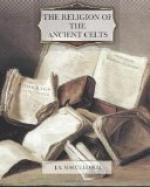The diffusion of the Ambicatus legend would help to preserve unity by recalling the mythic greatness of the past. The Boii and Insubri appealed to transalpine Gauls for aid by reminding them of the deeds of their ancestors.[50] Nor would the Druids omit to infuse into their pupils’ minds the sentiment of national greatness. For this and for other reasons, the Romans, to whom “the sovereignty of all Gaul” was an obnoxious watch-word, endeavoured to suppress them.[51] But the Celts were too widely scattered ever to form a compact empire.[52] The Roman empire extended itself gradually in the consciousness of its power; the cohesion of the Celts in an empire or under one king was made impossible by their migrations and diffusion. Their unity, such as it was, was broken by the revolt of the Teutonic tribes, and their subjugation was completed by Rome. The dreams of wide empire remained dreams. For the Celts, in spite of their vigour, have been a race of dreamers, their conquests in later times, those of the spirit rather than of the mailed fist. Their superiority has consisted in imparting to others their characteristics; organised unity and a vast empire could never be theirs.
FOOTNOTES:
[6] Ripley, Races of Europe; Wilser, L’Anthropologie, xiv. 494; Collignon, ibid. 1-20; Broca, Rev. d’Anthrop. ii. 589 ff.
[7] Sergi, The Mediterranean Race, 241 ff., 263 ff.
[8] Keane, Man, Past and Present, 511 ff., 521, 528.




